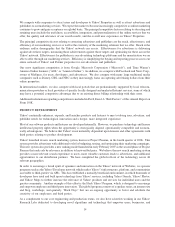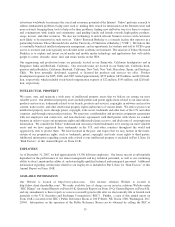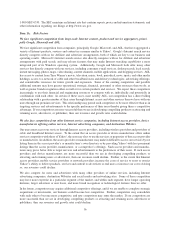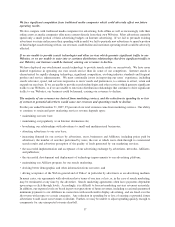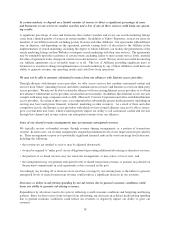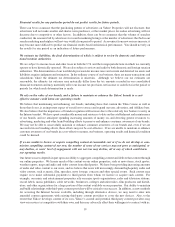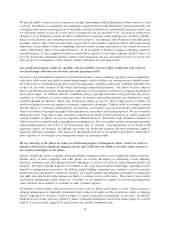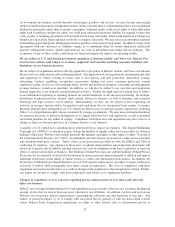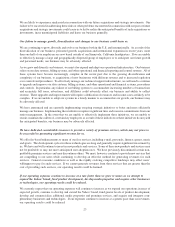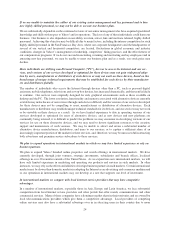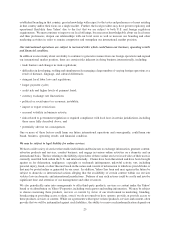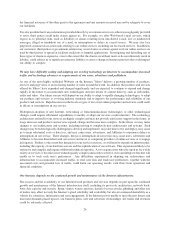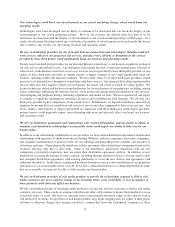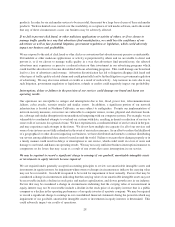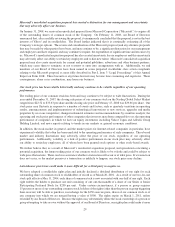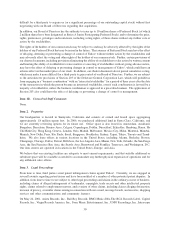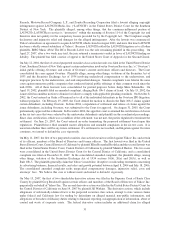Yahoo 2007 Annual Report Download - page 26
Download and view the complete annual report
Please find page 26 of the 2007 Yahoo annual report below. You can navigate through the pages in the report by either clicking on the pages listed below, or by using the keyword search tool below to find specific information within the annual report.If we are unable to maintain the caliber of our existing senior management and key personnel and to hire
new highly skilled personnel, we may not be able to execute our business plan.
We are substantially dependent on the continued services of our senior management who have acquired specialized
knowledge and skills with respect to Yahoo! and its operations. The loss of any of these individuals could harm our
business. Our business is also dependent on our ability to retain, attract, hire and motivate talented, highly skilled
personnel. Achieving this objective may be difficult due to many factors, including the intense competition for such
highly skilled personnel in the San Francisco Bay Area, where our corporate headquarters and the headquarters of
several of our vertical and horizontal competitors, are located, fluctuations in global economic and industry
conditions, changes in Yahoo!’s management or leadership, competitors’ hiring practices, and the effectiveness of
our compensation programs. If we do not succeed in recruiting, retaining and motivating our key employees and in
attracting new key personnel, we may be unable to meet our business plan and as a result, our stock price may
decline.
More individuals are utilizing non-Personal Computer (“PC”), devices to access the Internet and our ser-
vices, and versions of our services developed or optimized for these devices may not gain widespread adop-
tion by users, manufacturers or distributors of such devices or may not work on these devices, based on the
broad range of unique technical requirements that may be established for each device by their manufactur-
ers and distributors globally.
The number of individuals who access the Internet through devices other than a PC, such as personal digital
assistants, mobile telephones, televisions and set-top box devices, has increased dramatically, and the trend is likely
to continue. Our services were originally designed for rich, graphical environments such as those available on
desktop and the PC. The lower resolution, functionality and memory associated with alternative devices currently
available may make the use of our services through such devices difficult, and the versions of our services developed
for these devices may not be compelling to users, manufacturers or distributors of alternative devices. Each
manufacturer or distributor may establish unique technical standards for its devices, and our services may not work
or be viewable on these devices as a result. As we have limited experience to date in operating versions of our
services developed or optimized for users of alternative devices, and as new devices and new platforms are
continually being released, it is difficult to predict the problems we may encounter in developing versions of our
services for use on these alternative devices, and we may need to devote significant resources to the creation,
support and maintenance of such versions. We may be unable to attract and retain a substantial number of
alternative device manufacturers, distributors, and users to our services, or to capture a sufficient share of an
increasingly important portion of the market for these services, and, therefore, we may be unsuccessful in attracting
both advertisers and premium service subscribers to these services.
We plan to expand operations in international markets in which we may have limited experience or rely on
business partners.
We plan to expand Yahoo! branded online properties and search offerings in international markets. We have
currently developed, through joint ventures, strategic investments, subsidiaries and branch offices, localized
offerings in over 20 countries outside of the United States. As we expand into new international markets, we will
have only limited experience in marketing and operating our products and services in such markets. In other
instances, we may rely on the efforts and abilities of foreign business partners in such markets. Certain international
markets may be slower than domestic markets in adopting the Internet as an advertising and commerce medium and
so our operations in international markets may not develop at a rate that supports our level of investment.
In international markets we compete with local Internet service providers that may have competitive
advantages.
In a number of international markets, especially those in Asia, Europe and Latin America, we face substantial
competition from local Internet service providers and other portals that offer search, communications and other
commercial services. Many of these companies have a dominant market share in their territories and are owned by
local telecommunications providers which give them a competitive advantage. Local providers of competing
online services may also have a substantial advantage over us in attracting users in their country due to more
24


